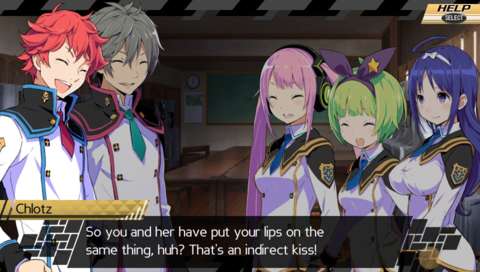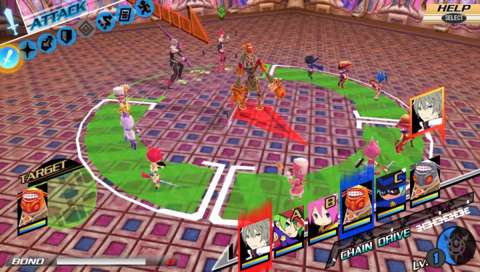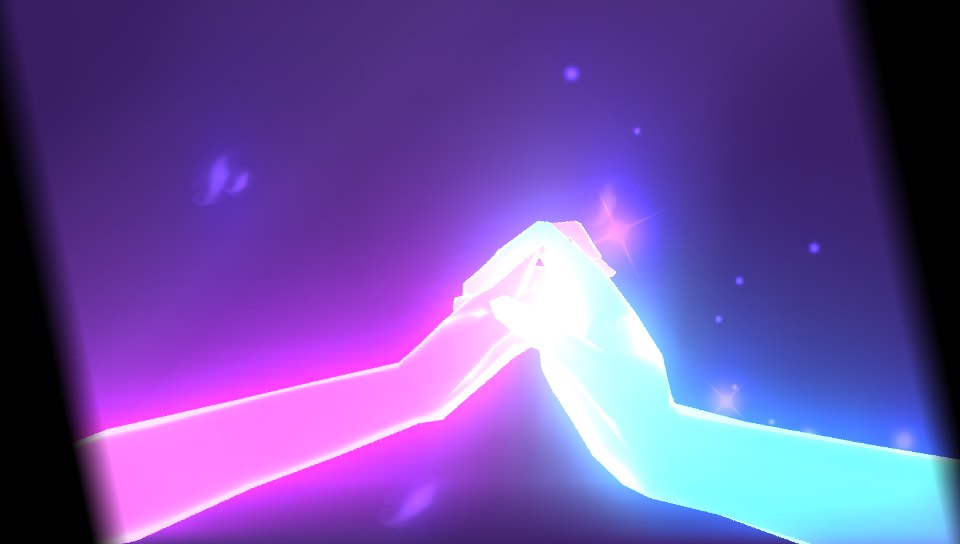Many parents call childbirth a magical experience, but few fathers can say that they've helped to magically conceive dozens of children with multiple mothers and taken them into dungeons on a quest to save the world.
Such is the conceit of Conception II: Children of the Seven Stars, a love child of role-playing and dating sim parents, though it's not a master of either genre. It mixes many Japanese role-playing game cliches with occasionally questionable treatment of its female characters, and then piles the concoction atop a turn-based battle system that doesn't live up to its potential. The resulting game is decidedly, painfully average.

Areas of darkness called dusk circles are opening all over the world, and from them are emerging monsters hell-bent on destruction. Many teenagers are blessed by the star god with special powers for fighting the dusk monsters, and these disciples are sent to a special school to be trained accordingly. Because of your unique ability as God's gift to enter these labyrinths at the center of dusk circles, it is up to you to put a stop to them.
You won't be going in alone. In addition to a female disciple of your choosing, you enter each labyrinth with a squad of star children--magical children created through a process called classmating. In a process not unlike fusing demons in a Persona game, you and one of the game's heroines come together and give birth to a tiny human that fights alongside you. You can take up to nine star children into a labyrinth, and they operate in teams of three.

At birth, star children are each assigned one of a wide variety of classes, such as magician, gunslinger, cleric, and hunter. Each class not only uses different types of weapons and armor, but also learns different abilities as the child levels up. Nothing will stop you from giving birth to nothing but archers, but it's smarter to experiment with different options, mixing and matching teams as you go. Each child also has an affinity for a certain element (such as fire or wind), which also contributes to which abilities a child team ultimately has.
Once you're inside a labyrinth, the basic flow of turn-based battle feels immediately familiar. Each team of three star children operates as one collective party member, while you and your chosen female companion do the same, rounding out a group of four. Your options are what you would expect if you've played a turn-based role-playing game in the past: You can attack, defend, flee battle, or use a variety of offensive and defensive skills that require mana. You conduct combat through floor after floor of randomized dungeons that look far too similar to each other, each sporting mazelike hallways and paths that often lead to obvious dead ends. From beginning to end, these labyrinths are nothing but bland.

There are a few ways that Conception II tries to differentiate itself with its combat, most obviously in character and enemy placement. Every enemy has four points around it in which you can stand when attacking, and one or more of those positions is designated as a weak spot. Different attacks do damage in different directions, so you must give some thought to where you attack each turn. The system doesn't require much brainpower, though, because a helpful red arrow tells you explicitly if you're going to hit an enemy's weak spot. Usually, the simple strategy of "aim for the weak spot" is all you need to succeed.
The other features of battle focus on letting you manipulate the turn order and move faster than your opponents. The chain drive, for instance, is a meter that rises incrementally as you attack, climbing higher if you attack from more dangerous positions (that is, not at an enemy's weak point or in a spot where you know an enemy attack is imminent). When the gauge reaches certain points, the monster you hit last will be chained and its turn temporarily pushed back. Similarly, there is a meter representing the current density of an element called ether; the higher the ether level, the faster your party moves.
You conduct combat through floor after floor of randomized dungeons that look far too similar to each other, each sporting mazelike hallways and paths that often lead to obvious dead ends.

The problem is that for most of the game, these elements can be more or less ignored. Chaining enemies, while useful, is rarely necessary for success until late in the game. The same goes for the ether density, a number that is always present at the bottom corner of the battle screen but that is easy to forget about.
Classmating is where the dating sim aspect of Conception II comes in. In order to make more powerful star children, the people classmating together must have good relationships with each other. Therefore, it's necessary to get to know the game's seven lead females outside of classes and labyrinths.
The story presents the classmating ritual as innocent enough, and the act is initially accomplished by both "parents" merely holding hands. But while the game states that classmating is a pure-hearted process, it implies inappropriate levels of lasciviousness. All conversations about classmating are packed with blatant innuendo, and the game doesn't shy away from adolescent levels of sexual humor, featuring talk of bust sizes and looking up girls' skirts, and depicting an uncomfortably perverted priest. There are moments when the game does an acceptable job of at least contextualizing the sexual overtones and providing balance to this kind of sexism; there are even times when the story explores its themes of teenage sexuality on a mature level. Too often, however, the winks and nudges of the dialogue go too far into the realm of crassness, as if the writers are constantly poking you and shouting, "Get it? It's like we're talking about sex even when we're not!"

Even if much of the innuendo seems harmless enough, each time you perform the classmating ritual, you view animations of the girls' naked silhouettes in increasingly suggestive poses. These scenes lack the playful dialogue surrounding the ritual and come across as gross pandering as a result, so it's fortunate that they can be skipped with the tap of a button.
Whether or not you're bothered by the overtly sexual content, neither getting to know the heroines nor fighting with them in dungeons is as entertaining in Conception II as in games that are more focused on either of those tasks. The relationships are too shallow and too simple to be meaningful. While you often have different choices and dialogue options in each scenario, most situations are straightforward and almost always lead to an improved relationship. You can also give the girls gifts from time to time, but their affection for you rises so quickly that gift giving is wholly unnecessary. It's also relatively brainless; it doesn't take Casanova to deduce that the girl whose storyline revolves around photography might like receiving a camera badge. Finishing the game with all seven lead females in love with you is not a difficult feat.
All conversations about classmating are packed with blatant innuendo, and the game doesn't shy away from adolescent levels of sexual humor, featuring talk of bust sizes and looking up girls' skirts, and depicting an uncomfortably perverted priest.
Perhaps the biggest problem with all this socializing, though, is that most of the plotlines are uninteresting. One girl's story tells a decent ghost tale, and there are touching moments here and there with the other girls, most of which are innocent despite the hints at more mature subject matter, but for the most part, it's difficult to care about any of these stories.
Sadly, that rings true for the main plot as well. While it kicks off with an interesting Harry Potter-esque vibe with its school setting and three initial characters that reflect the Harry Potter universe's main trio (the main character is a "chosen one," the best friend is a clumsy redhead, and the female best friend has book smarts), Conception II never makes you care about the bigger picture, and you can see its twists a mile away. If you prefer to hear the tale in the original Japanese, you'll be disappointed with the lack of a Japanese voice-over option, stuck as you are with English voice acting that runs the gamut from terrible to halfway decent.
Conception II's combat shows hints of being novel early on, but is neither difficult enough nor entertaining enough to warrant much attention. In fact, you can turn on an auto-battle function at the press of a button, and provided you've set your party's tactics appropriately, you can automate your way through the majority of the game, stopping only when the game hits a difficulty spike toward the end. The game functions as intended but lacks imagination and spark, leaving a lot of potential untapped. Persona 4 Golden on the Vita and Shin Megami Tensei IV on the 3DS are far superior options, but if you've already exhausted those games and want something in the same vein, Conception II can scratch that itch. It's competent, certainly, but it's hard to shake the feeling that the stork could have left us something a little more interesting.